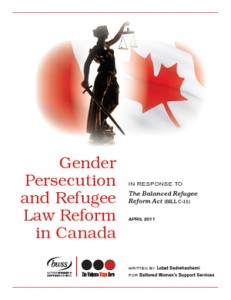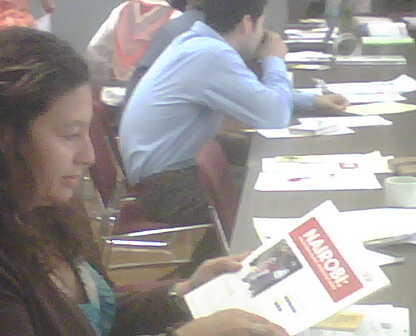Apr 23, 2011 | Battered Women's Support Services, Immigrant Women
A Journey to Freedom: Supporting Refugee Women Who Are Dealing with Violence
By Rosa Elena Arteaga, Manager, Direct Services & Programs
At BWSS we have been supporting a number of refugee women who have experienced violence and who are going through their refugee process. During the last twelve months a high percentage of the women who accessed our services and who were going through their refugee process had their claims accepted.
It has been a long journey for the women to reach an official answer that acknowledges that they have the right to protection and freedom from abuse. Each woman has a journey that stems from their strength to escape from their abusive partners, from their country of origin, to the strength to come to an unknown country with the only hope to finally become free from violence. However, at their arrival, they had to face a system that does not understand violence against women and its effects as well as a system that does not understand the migration of abuse across the lifecycle, which follows girls and women through infancy, childhood, adolescence, adulthood, and as elders.
What did it take for the women to succeed with their claim for freedom? For some of them, it took the support from a family member, a friend, or a neighbour who helped them to escape to Canada. In Canada, it took the support of an anti-violence women’s organization, BWSS, which assisted them to access the right lawyer, the right interpreter, and the right counsellor. BWSS team supported each by identifying and understanding the range of needs from forced migration, sexual violence, and intimate violence to the spectrum of cultural needs. It took an approach which identifies the strength, barriers, needs and support needed from settlement to empowerment.
It took the consistency and commitment of the BWSS team to support each woman’s journey through its programming such as legal advocacy, Stopping The Violence counselling, language specific support groups, and employment program. For the majority of the women their refugee process took more than a year and during that year they were consistently accessing BWSS programs. In addition, it took the willingness of their immigration lawyers to learn and understand about the impacts of abuse. The lawyers became aware that women’s lost of memory, lack of trust, and their overwhelming fear does not relate to their intellectual capacity, cultural background or the veracity of their story, rather it relates to the impact of the violence that they have experienced though their whole life.
Finally, it took the women’s strength and resilience to escape from violence, to expose themselves to strangers and tell their stories, their consistency in contacting their friends, neighbours, family, women’s organizations in their countries of origin so they could gather evidence and expose that gender violence is a social issue and that women’s right to protection is not merely granted.
After a long and painful journey each woman has identified her unique strength, her value, her success and her right to live free from violence. We at BWSS stand and work in solidarity with all women who are on a journey to freedom.
Apr 18, 2011 | Battered Women's Support Services, Immigrant Women, Violence against women
In Response to: The Balanced Refugee Reform Act (BILL C-11)
April 2011
Written by: Lobat Sadrehashemi
For: Battered Women’s Support Services
Gender Persecution and Refugee Law Reform in Canada
Our refugee system is going to fundamentally change over the next year to 2012. Battered Women’s Support Services has identified that the changes will make it more difficult for women fleeing gender-related persecution.
The amendments to IRPA under Bill C-11 and the proposed regulations is a major shift in our refugee determination process. There are many changes. Key changes include:
- INTERVIEW INSTEAD OF WRITTEN NARRATIVE: There will no longer be a Personal Information Form (“PIF”) where a claimant can explain in writing the basis of their fear of return. Instead the initial step after an eligibility determination will be an interview with an official from the IRB; a transcript of this interview will be provided to the Member hearing the refugee claim.
- FAST TIMELINES : The timelines are fast for all steps in the process, from interview, through to hearing, and then appeal at the new Refugee Appeal Division.
- DIFFERENT TIMELINES FOR DIFFERENT COUNTRIES OF ORIGIN: For the first time claimants from particular countries that have been designated by the Minister of Citizenship and Immigration Canada will be subject to quicker timelines for their refugee hearings and for decision from their appeals to the Refugee Appeal Division.
- RIGHT OF APPEAL: Both the claimant and the Minister have a right to appeal refugee decisions to a new body, the Refugee Appeal Division.
Read the entire article here.

Mar 14, 2011 | Battered Women's Support Services, Immigrant Women
Engaging Immigrant Women in the Legal System – Final Report
Introduction
During a time of increased cutbacks in accessible legal services, particularly legal aid, Immigrant women survivors of violence and abuse are faced with further barriers in navigating the justice system. The impact of abuse, migration and discrimination on Immigrant women’s lives make Immigrant women particularly vulnerable to further victimization by the justice system.
The aim of the EIWITLS project is to make public the voices of Immigrant women through their active engagement in analyzing systemic legal issues from their experiences and perspectives. We strongly believe that engaging Immigrant women has better equipped us to develop strategies that effectively address the barriers women face. The ultimate goal of the EIWITLS project has been to create systemic change in the legal system through empowerment of Immigrant women and a strong community response to legal barriers.
The structure of the project is built on an empowerment model informed by feminist and anti-oppression frameworks. We believe that the experiences of women, their narratives and voices need to be part of any initiative which intends to address Immigrant women’s issues.
The process of empowerment is an essential aspect of social justice initiatives; hence, the involvement of Immigrant women has been sought in all aspects of the project. By engaging Immigrant women in the process of researching, identifying issues and creating relevant legal resources for their communities, the project has built on the capacity of Immigrant women to take on a leadership role in their communities.
The outcome of this engagement is threefold; firstly, the project has been successful in building on the capacity of Immigrant women to become resourceful leaders in their communities. Immigrant women are often consulted by and provide support to other women in their social networks. Since legal information and resources are often inaccessible to Immigrant women, inaccurate assumption regarding the law is usually prevalent. Furthermore, Immigrant women are often unaware of available social and legal services for women. The Self Advocacy Trainings and other legal trainings conducted in these communities, offered accurate, relevant and language specific legal information to women. To read the report, click this link: BWSS_Engaging_Immigrant_Women_in_the_Legal_System
Engaging Immigrant Women in the Legal System Initiative has been made possible with funding from The Law Foundation of BC and My Sister’s Closet Social Enterprise of Battered Women’s Support Services
Jan 26, 2011 | Immigrant Women
“It’s hard enough to get a job today. Imagine trying to enter the workforce after spending nearly two decades in a refugee camp. That’s the harsh reality for more than 40 million people around the globe who are currently displaced by armed conflict, human rights abuses and natural disasters. Forced to flee their homes and their jobs, they’ve been thrust into a world with little means of supporting themselves and their families.”
Read the entire article about the Women’s Refugee Commission is working on that problem in its three-year Livelihoods Project and watch a video on Care2.com
Aug 27, 2010 | Battered Women's Support Services, Immigrant Women, Violence against women

Rosa Elena Arteaga, of Battered Women’s Support Services, is in Montreal this week to participate as members of Canadian Council of Refugees Working Groups.
Click here to read ‘Protection Delayed, Protection Denied’ that includes ‘Amina’s Story’—a story about a woman and her family who fled Ethiopia because of severe ethnic persecution and who are still waiting after five years of submitting documents to Canadian immigration offices to start their new lives together in Canada.






